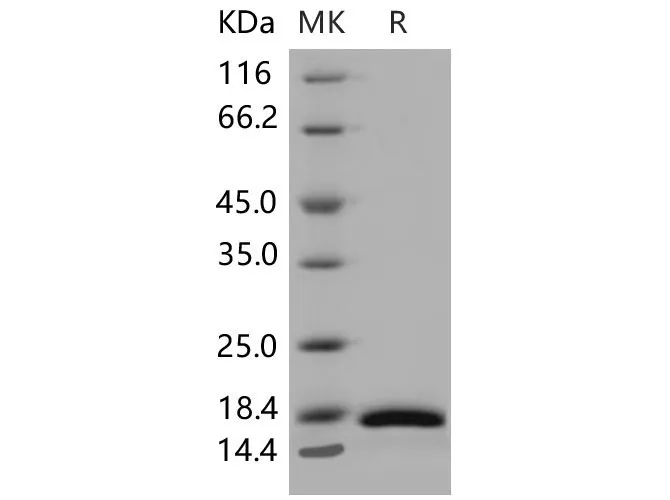Recombinant Mouse CRABP2 Protein (His Tag)
CAT:
763-PKSM040629
Size:
100 µg
Price:
Ask
- Availability: 24/48H Stock Items & 2 to 6 Weeks non Stock Items.
- Dry Ice Shipment: No




Recombinant Mouse CRABP2 Protein (His Tag)
- Background: Cellular retinoic acid-binding protein 2, also known as Cellular retinoic acid-binding protein II, CRABP-II and CRABP2, is a protein which belongs to thecalycin superfamily and Fatty-acid binding protein (FABP) family. Cellular retinoic acid binding proteins (CRABP) are low molecular weight proteins whose precise function remains unknown. The predicted amino acid sequences of human CRABP1 and CRABP2 demonstrated a 99.3% and 93.5% identity to mouse CRABP1 and CRABP2, respectively. CRABP2 forms a beta-barrel structure that accommodates hydrophobic ligands in its interior. Expression of CRABP2, but not CRABP1 mRNA, was markedly increased (greater than 15-fold) by retinoic acid treatment of fibroblasts cultured from human skin, whereas no significant induction of CRABP2 mRNA was observed in human lung fibroblasts. CRABP2 transports retinoic acid to the nucleus. It regulates the access of retinoic acid to the nuclear retinoic acid receptors. CRABP2 is necessary for elastin induction by All-trans retinoic acid (ATRA) in MRC-5 cells. It is expressed at low levels in emphysema fibroblasts. This alteration in the retinoic acid signalling pathway in lung fibroblasts may contribute to the defect of alveolar repair in human pulmonary emphysema.
- Synonyms: AI893628, Crabp-2, CrabpII
- CAS Number: 9000-83-3
- UniProt: P22935
- Accession Number: P22935
- Host: E. coli
- Origin Species: Mouse
- Tag: N-His
- Sequence: Pro 2-Glu 138
- Purity: > 96 % as determined by reducing SDS-PAGE.
- Bioactivity: Not validated for activity
- Reconstitution: Please refer to the printed manual for detailed information.
- Molecular Weight: 18 kDa
- Shipping Conditions: This product is provided as lyophilized powder which is shipped with ice packs.
- Storage Conditions: Generally, lyophilized proteins are stable for up to 12 months when stored at -20 to -80°C. Reconstituted protein solution can be stored at 4-8°C for 2-7 days. Aliquots of reconstituted samples are stable at < -20°C for 3 months.
